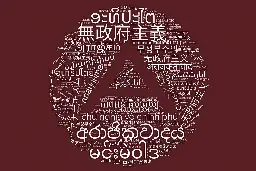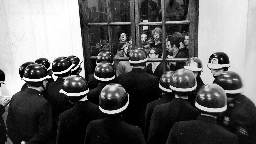> Since 2014, West Jackson has been the home of a remarkable and inspiring project to build a solidarity economy, economic democracy, and Black self-determination called “Cooperation Jackson.” Co-founded and co-directed by the brilliant and charismatic Kali Akuno—who joins us for Utopia 2/13—Cooperation Jackson is a model of an alternative way of life that has already spawned other projects coast to coast, from Cooperation Vermont to Cooperation Humboldt in California. > > What makes Cooperation Jackson such an important case study of concrete utopia is that it is so richly three-dimensional—along the axes of history, theory, and practice.
I am a degrowther, but people keep telling me it's hard to create media communications campaigns for degrowth and that advocating for it is "political suicide." As if endless cancerous growth isn't political suicide already. I'm told people want growth and we should use a different name for degrowth and that we should make it palatable to the public. But degrowth is quite literally a critique of growth. Without this critique, it's just liberal wishywashing for a better future. So I'm at an impasse here. How do we talk about meaningfully talk about degrowth without watering down the message?
Was the name “Free Territory” something used by contemporaries of anarchist leader Nestor Makhno, or a modern fabrication? In the spirit of debunking widespread myths and misconceptions in anarchist history, a Wikipedian uncovers the secret history of the making of the “Free Territory.”

>...other users had questioned whether the term 'Free Territory' had any basis in reliable sources. I was a little surprised. This was the term that I had used for years, one that was inextricably linked in my mind with the Makhnovists. This could not just be some random neologism coined by Wikipedia… right? > >At first I could not let myself believe it. I looked through Makhno’s memoirs, as well as Volin’s and Arshinov’s histories, but I could not find the term anywhere. I even checked the Russian language originals, and peered through Viktor Bilash’s memoirs, which tragically remains untranslated. Again, I found no sign of a 'Free Territory'. I could not even find it in the memoirs of Victor Serge, the Bolshevik politician who coined the term 'Black Army' to refer to the Makhnovist insurgents.
I think you're fundamentally misunderstanding that social relationships to harm are fundamentally changed under conditions of anarchy. I apologize for the misunderstanding as writing on obscure forums doesn't exactly encourage me to write with vigor.
Of course there would be a plurality of violence under conditions of anarchy, but this does not fundamentally mean the rule of vigilantism. Right now, people have been dealing with harm without the state for generations. These are found in criminalized communities like Black and Indigenous people, people who use drugs, people who engage in sex work, etc. These people develop mechanisms by which to deal with harm without the state and oftentimes without engaging in vigilantism. For these people, vigilantism is not a court of first resort but a last resort. Vigilantism puts a target on their back from the state. Instead, they talk it out, develop safety plans, plan boycotts and bans, etc.
Rather than thinking of justice in anarchic terms as vigilantism, think of it in terms of people dealing with harm and conflict in healthy ways.
> I. Occupations are effective because they are disruptive. The April 1968 occupations shut down the entire university for over a week. This forced the administration to concede to their demands, even after the movement faced repression. > >II. An occupation needs to spread in order to survive. New buildings need to be taken on campus, throughout the city, and across the country. Take the enemy by surprise. Strive for daily or even hourly successes, however small. At all costs, retain superior morale. > > III. Every occupation is a commune. By shutting down the normal flows of capitalist society, they open up space for something new to emerge. These become a place to experiment with how we might live differently. Share everything. Inside the occupation, there is no private property. Break down barriers. Inside, social status and jobs are meaningless.
During the Ukrainian Revolution, there were all sorts of gangs that emerged that killed Jews and stuff. What did anarchists do? They killed those pogromists in turn. Under conditions of anarchy, there is no state that has a monopoly on the legitimate use of violence to punish those who break the "social contract." Rather, there is a plurality of violence that various groups can inflict on offenders. If you fuck around, you will find out.
Is this a violent sort of life? Not really. It's not as if Indigenous or pre-state peoples live in violence all the time. Sure, violence did happen, so what?, violence happens all the time under state societies too. The difference is that without a state, people cannot call on a higher power to coerce so they have to rely on each other to keep each other safe. Besides, the people doing the raping, stealing, and killing in state societies are precisely the people protected by privilege and the state. Under conditions of anarchy, such privileges mean very little.
Anthropology has a lot to teach us on how people dealt with such large-scale endeavors without the state. If there's conflict, they find a mediator or perhaps hold a meeting between the two groups to hash these things out. Sometimes, two groups would go to war. But anarchy is not merely statelessness, it means a society of consent and collaboration without hierarchy. Previous forms of statelessness may see peoples going to war or exert hierarchy with one another over any sort of disagreement or conflict, but anarchy means means a commitment to figuring out how to settle conflict and disagreements without hierarchy. So yes, anthropology has a lot to teach us on how people dealt with conflict in healthy ways. Sometimes they'd settle conflict in violent ways, but our purpose is to learn from these and do better.
tl;d: how is this done? talk to each other and learn from how people mediated conflict without states.
What's disturbing is that Fredy Perlman wrote that decades ago.

Alt text:
Boss made a dollar I made a dime that was a poem from a simpler time
Now the boss makes a thousand and gives us a cent while hes got employees who cant pay rent
So when boss makes a million nd the workers make jack thats when we strike and take our lives back
<sarcasm>Yes, it's true: before work was invented everyone lived in their own filth and starved all the time because work hadn't been invented yet. </sarcasm>
Beyond jokes, my intention here is to clarify what is meant by antiwork. Antiwork does not mean that a world that has abolished work would see people live in filth and starve. In a world that has abolished work, people will still farm, clean, teach, provide medicine, take out fires, et cetera. Antiwork means the revolutionary abolition of the world of work and all that entails: a waged-labor, a division of labor between waged work and house work, alienation, bullshit jobs, a division between leisure and waged work, compulsion to work or starve, et cetera. Some people call this degrowth, others communism, still others anarchy.
So:
What is work?
Work is a lot of things. For starters, it developed historically from feudal times and had since evolved in its current form in the capitalist mode of production. Within the context of the capitalist mode of production work is waged-labor or reproductive (or house) work and is defined by divisions and alienations. These include a division of labor between waged work and house work, alienation, a division between leisure and waged work, and a compulsion to work or starve. That last one is important. Working people today are free to not work, or starve. This is the freedom that work grants us.
Will people starve and live in filth?
No. Antiwork does not mean that a world that has abolished work would see people live in filth and starve. In a world that has abolished work, people will still farm, clean, teach, provide medicine, take out fires, et cetera.
Will people be bored without work?
I think it's more accurate to say people will be bored by work. A world that has abolished work will still see people that keep themselves busy. Historically speaking, during the Age of Enlightenment, it was the leisure class that didn't do work that was able to make all sorts of exciting and revolutionary ideas about science and art. They won the right to not work because they were privileged due to their wealth. If everyone was able to free themselves from the drudgery of work, what wonders could they achieve?
I expect this post to be a sort of living document. Please feel free to ask questions and I'll try to answer it in the post. ___
Liao demonstrates the need and utility of Asian anarchism, a new theoretical framework which will unite strands of Asian and Asian diasporic thought.

>Why is a theory of Asian anarchism necessary? The reasons that I believe it is important to create a theory of Asian anarchism can be boiled down to the following points. > >Firstly, the movements of anarchism that currently exist within Asian countries have historically been intertwined and transnational. This provides not only a pre-existing framework for a broad theory of all-encompassing Asian anarchism, but also has the potential to create stronger pan-Asian solidarity. > >Secondly, historical Asian anarchist movements had many unique successes and failures that differ from the anarchist movements in the West. Hence, a theory of Asian anarchism would have a new mode of analysis on organisational practices, past and current projects, potential paths forward, and fatal missteps. > >Thirdly, Asian philosophies such as Taoism and Buddhism have had a significant influence on all anarchists and have made major contributions to anarchist theory. Putting more emphasis and finding more philosophical precedents would surely recover old ideas and inspire new contributions to the body of anarchist theory. > >Fourthly, the unique experiences of Asian peoples as a result of colonialism and imperialism that they have been subjected to provide a unique outlook on these struggles. Rather than only opposing and pointing out the inherent evils such as capitalism and the State, Asian anarchism would draw from historical experience and lasting effects of Western colonialism such as British rule in India and China. > >Fifthly, as we advance into late-stage capitalism and are forced to live under neoliberal principles, many things that Asians hold valuable such as our cultures, the environment, and our social relations are being destroyed. By forming a theory of Asian anarchism through the lens of important values, we can effectively address the immiseration that Asian communities are dealing with.
Finally, a correct answer within the context.
No the hydrogen is not a battery, it is gray hydrogen sourced from fossil gas or coal. This makes the hydrogen still a fossil fuel. Green hydrogen doesn't have this problem.

Apparently, he's also a socialist.
OOoooh interesting stuff! Thanks for sharing.
John Markoff, Hillary Lazar, Benjamin S. Case and Daniel P. Burridge The Anarchist Turn in Twenty-First Century Leftwing Activism 14 March 2024

> Leftwing activism of recent decades exhibits an anarchist turn evident in quantitative indicators like mentions of anarchists in news reports and by activists adopting anarchist modes of organization, tactics, and social goals-whether or not they claim that label. The authors of this Element argue that the very crises that generated radical mobilizations since the turn of the millennium have both led activists to reject other strategies for social transformation and to see anarchist practices as appropriate to the challenges of our time. This turn is clearly apparent in the Americas and Europe, and has reverberations on an even broader transnational, perhaps global, scale. This suggests the need for research on social movements to consider anarchists and other marginalized radical traditions more fully, not just as objects of study, but as important sources of theory.
I don't think I count but I've been trying to push the envelope on social ecology in the climate movements in the Philippines
To me, the meme acknowledges that GOG installers are shared in groups, which is piracy since the other people didn't pay for it. (That doesn't mean it's bad btw.)
To me, the meme acknowledges that GOG installers are shared in groups, which is piracy since the other people didn't pay for it. (That doesn't mean it's bad btw.)
To me, the meme acknowledges that GOG installers are shared in groups, which is piracy since the other people didn't pay for it. (That doesn't mean it's bad btw.)
Alright then
Praying for a free Palestine in our lifetime.
Good to know then.
My opposition to nuclear isn't merely because it is dirty, deadly, and costly but also because it relies on a specific technology of power to implement, a specific technology of power that has always been highly authoritarian. As part of the green movement of my country, we also push for denuclearization precisely because the 300mW nuclear power plant was built without democratic oversight. (Imagine risking non-zero chance of meltdown for a measly 300 mW!) Democratic movements are more likely to oppose nuclear energy, so it's no wonder countries who are poor in democracy like China, USA, Russia, and France build and maintain nuclear power plants despite the public opposition.
Not only that, but nuclear power fuels the valorization process under the capitalist mode of production. Even if the whole world shifts to nuclear energy, the same technology of power that constructed the nuclear power plants would also go about oppressing people.
Nuclear energy can only operate under a specifically authoritarian technology of power. A free society—whether that be anarchist, communist, or radically democratic—simply cannot use the violence needed to construct a nuclear power plant.
But you probably don't care about that. For you, this technology of power is probably a desideratum as long as you get your damn iPhones and airconditioning.
Haven't read those but I greatly enjoyed his four books, the Mars Trilogy and the additional Martian short story collection. Quite a bit of Mars Trilogy was inspired by the political philosophy of Murray Bookchin, now appreciated for anticipating a lot of the political philosophy behind solarpunk and degrowth.
Pro-nuke energy is getting more and more indefensible after each disaster. May I remind you that literally nobody knows how to deal with long term storage of nuclear waste. No, dumping them in bunkers is not a long-term solution and never was sustainable.
New developments in nuclear technology like with small modular reactors would produce more nuclear waste than conventional reactors. Not to mention that there isn't enough uranium in the entire Earth for the whole world to shift to nuclear. It's dangerous, expensive, and its waste is also dangerous and expensive.
That's not the point. Only states can deploy nuclear energy. A city or province can't do it. Only fossil fuels or renewables can guarantee local energy sovereignty. And since fossil fuels are bad, that leaves only renewables.












